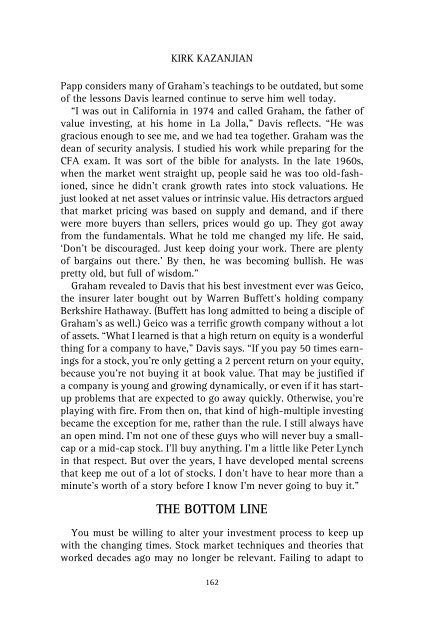Create successful ePaper yourself
Turn your PDF publications into a flip-book with our unique Google optimized e-Paper software.
KIRK KAZANJIAN<br />
Papp considers many of Graham’s teachings to be outdated, but some<br />
of the lessons Davis learned continue to serve him well today.<br />
“I was out in California in 1974 and called Graham, the father of<br />
value investing, at his home in La Jolla,” Davis reflects. “He was<br />
gracious enough to see me, and we had tea together. Graham was the<br />
dean of security analysis. I studied his work while preparing for the<br />
CFA exam. It was sort of the bible for analysts. In the late 1960s,<br />
when the market went straight up, people said he was too old-fashioned,<br />
since he didn’t crank growth rates into stock valuations. He<br />
just looked at net asset values or intrinsic value. His detractors argued<br />
that market pricing was based on supply and demand, and if there<br />
were more buyers than sellers, prices would go up. They got away<br />
from the fundamentals. What he told me changed my life. He said,<br />
‘Don’t be discouraged. Just keep doing your work. There are plenty<br />
of bargains out there.’ By then, he was be<strong>com</strong>ing bullish. He was<br />
pretty old, but full of wisdom.”<br />
Graham revealed to Davis that his best investment ever was Geico,<br />
the insurer later bought out by Warren Buffett’s holding <strong>com</strong>pany<br />
Berkshire Hathaway. (Buffett has long admitted to being a disciple of<br />
Graham’s as well.) Geico was a terrific growth <strong>com</strong>pany without a lot<br />
of assets. “What I learned is that a high return on equity is a wonderful<br />
thing for a <strong>com</strong>pany to have,” Davis says. “If you pay 50 times earnings<br />
for a stock, you’re only getting a 2 percent return on your equity,<br />
because you’re not buying it at book value. That may be justified if<br />
a <strong>com</strong>pany is young and growing dynamically, or even if it has startup<br />
problems that are expected to go away quickly. Otherwise, you’re<br />
playing with fire. From then on, that kind of high-multiple investing<br />
became the exception for me, rather than the rule. I still always have<br />
an open mind. I’m not one of these guys who will never buy a smallcap<br />
or a mid-cap stock. I’ll buy anything. I’m a little like Peter Lynch<br />
in that respect. But over the years, I have developed mental screens<br />
that keep me out of a lot of stocks. I don’t have to hear more than a<br />
minute’s worth of a story before I know I’m never going to buy it.”<br />
THE BOTTOM LINE<br />
You must be willing to alter your investment process to keep up<br />
with the changing times. Stock market techniques and theories that<br />
worked decades ago may no longer be relevant. Failing to adapt to<br />
162










